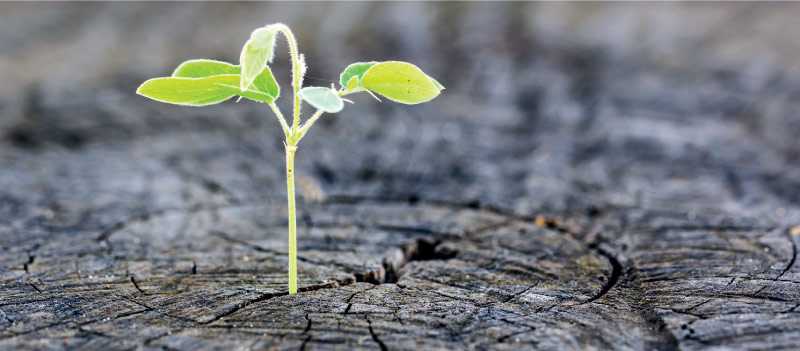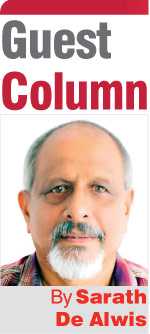Sunday Feb 15, 2026
Sunday Feb 15, 2026
Friday, 4 December 2020 00:00 - - {{hitsCtrl.values.hits}}

It has been said that hope is the only thing stronger than fear
“The further a society drifts from the truth, the more it will hate those that speak it” – George Orwell
 Human mind and hope
Human mind and hope
Events don’t always turn out the way we expect them to unfold. Matters do not transpire all the time in the manner clever people scheme, ordinary people propose, or do-gooders intend.
In such distressing, futile times, we experience pain in its most insufferable form. We then begin to see obstacles in their most punishing order – as insurmountable, impractical and at times with that sinking feeling that there is no more hope.
It has been said that hope is the only thing stronger than fear. That perhaps is the case of those rare people who claim that the only thing to fear is fear itself.
Unfortunately, many of us don’t possess the capacity to see or experience fear with that sanguine simplicity. Some of us are very human.
But we must have hope. Hope in the form of an inner strength, deep down in our frail human shape, to pull through current adversity in the intense, stubborn mindset that informs us that the present darkness is also the promise of a pending dawn.
That kind of hope helps us to survive and keep going. It anesthetises our pain and benumbs our fear. Hope, then is a combination of optimism and conviction. We call it the ‘human spirit’.
The pandemic is a stressful experience for a person in their late seventies. I have my share of fears and worries about my six grandchildren who by now should have been pursuing their higher studies in university. Confined to my home, I find rereading old classics as a reassuring therapy against pandemic induced neurosis.
‘East of Eden’ is John Steinbeck’s most ambitious novel. It explores human depravity, human benevolence, love and the struggle for acceptance and greatness. Steinbeck makes a point which is the point of departure of this brief essay.
In his 1955 novel ‘East of Eden,’ Steinbeck stumbles upon two sweepingly universal truths. “…the free exploring mind of the individual human is the most valuable thing in the world. And this I would fight for: the freedom of the mind to take any direction if it wishes undirected.”
The second is judiciously persuasive. “Evil does not always win. Evil doesn’t die out either.”
Steinbeck reaches out for the timeless spirit of the humankind in the 13th chapter of ‘East of Eden’.
It is a compellingly lyrical meditation on the meaning and essence of life and the creative genius in every human breast.
“Sometimes a kind of glory lights up the mind of a man. It happens to nearly everyone. You can feel it growing or preparing like a fuse burning toward dynamite.
It is a feeling in the stomach, a delight of the nerves, of the forearms. The skin tastes the air, and every deep-drawn breath is sweet. Its beginning has the pleasure of a great stretching yawn; it flashes in the brain and the whole world glows outside your eyes.
A man may have lived all of his life in the grey, and the land and trees of him dark and sombre.
The events, even the important ones, may have trooped by faceless and pale.
And then — the glory — so that a cricket song sweetens his ears, the smell of the earth rises chanting to his nose, and dappling light under a tree blesses his eyes.
Then a man pours outward, a torrent of him, and yet he is not diminished. And I guess a man’s importance in the world can be measured by the quality and number of his glories. It is a lonely thing, but it relates us to the world. It is the mother of all creativeness, and it sets each man separate from all other men.”
Rereading Steinbeck has been quite a reward. The greatest mystery as Steinbeck points out is the inductive leap of the human mind.
Declaration of the Independence of the Mind
Throughout modern history, when societies adopted constitutional governance and the rule of law, intellectuals, professionals, artists and clerics of eminence have in many instances placed their knowledge, expertise, authority and repute in the service of their governments. It is not something new.
In 1919, the celebrated essayist, novelist, playwright and Nobel laureate Romain Roland penned a remarkable text which he titled ‘Declaration of the Independence of the Mind. It was a poignant, impassioned cry for deploying the power of art, intellectual inquiry and moral authority to elevate the human spirit and not for propaganda, destruction of moral propriety and divisiveness.
The ‘Declaration of the Independence of the Mind’ was signed by the most prominent intellectuals of the time including our own Ananda Coomaraswamy. The other familiar names were Rabindranath Tagore, Herman Hesse, Albert Einstein and Bertrand Russel.
It was written just after the end of the First World War. It makes a great read even today. The emotions and perspectives have a timeless quality. It appeals to intellectuals and professionals capable of reason.
“First of all, let us point out the disasters that have resulted from the almost complete abdication of intelligence throughout the world, and from its voluntary enslavement to the unchained forces. Thinkers, artists, have added an incalculable quantity of hate to the plague that has devoured the human kind.
“In the arsenal of their knowledge, their memory, their imagination, they have sought reasons for hatred, reasons old and new, reasons historical, scientific, logical, and poetical. They have worked to destroy mutual understanding and mutual love among men. So, doing, they have disfigured, defiled, debased, degraded thought, of which they were the representatives. They have made it an instrument of the passions; and (unwittingly, perchance) they have made it a tool of the selfish interests of a political or social clique, of a state, a country, or a class.
In the fierce conflict, the victors and the vanquished emerge equally stricken, impoverished, and at the bottom of their hearts (though they will not admit it) utterly ashamed of their access of mania—now, Thought, which has been entangled in their struggles, emerges, like them, fallen from her high estate.
Arise! Let us free the mind from these compromises, from these unworthy alliances, from these veiled slaveries! Mind is no one's servitor. It is we who are the servitors of mind. We have no other master. We exist to bear its light, to defend its light, to rally round it all the strayed sheep of mankind. Our role, our duty, is to be a centre of stability, to point out the pole star, amid the whirlwind of passions in the night. Among these passions of pride and mutual destruction, we make no choice; we reject them all. Truth only do we honour; truth that is free, frontierless, limitless; truth that knows nought of the prejudices of race or caste.
Not that we lack interest in humanity. For humanity we work, but for humanity.
We know nothing of peoples. we know the people, unique and universal; the people which suffers, which struggles, which falls and rises to its feet once more, and which continues to advance along the rough road drenched with its sweat and its blood; the people, all men, all alike our brothers. In order that they may, like us, realise this brotherhood, we raise above their blind struggles the Ark of the Covenant—Mind which is free, one and manifold, eternal.”
If there is hope, such hope resides in the independence of the human mind.